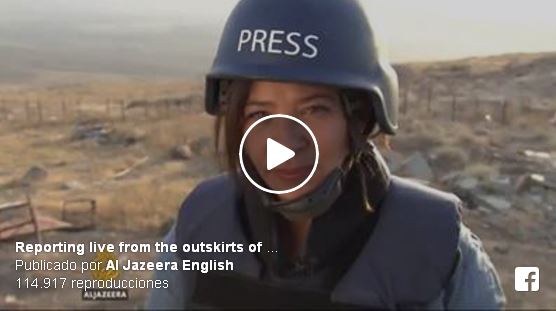BATTLE FOR MOSUL
Fighting has entered a third day as allied forces continued their advance on Mosul on Wednesday, an offensive that in recent days was slowed by explosives and booby traps encountered on the way to retake ISIL's last major stronghold in Iraq.
Iraqi commanders said that progress was being made as their forces pushed from two main fronts against ISIL, also known as the Islamic State of Iraq and the Levant group, or ISIS.
"The shelling is intensifying, and the battle is [still] going on," Al Jazeera's Imran Khan, reporting from Khazir near the frontline, said. Some crucial villages on the road to Mosul were taken by Kurdish Peshmerga forces, he reported.
"There is still another 20km to go before Kurdish Peshmerga forces get to the outskirts of Mosul," Khan added, "but this isn't about the Peshmerga forces. Prime Minister Haider al-Abadi has said that only Iraqi forces can go into Mosul, that this is their fight, and it's likely [that] the main push will come from the northeast."
The commanders of the allied forces said the operation was going as planned, despite resistance from ISIL fighters who were hitting back with suicide car bomb attacks.
"Many villages have already been liberated," said Sabah al-Numan, the spokesman of the elite "counter-terrorism" service.
"Iraqi forces have achieved their goals and even more, but we're careful to stick to the plan and not rush this."
ISIL forces are believed to be vastly outnumbered, with the US military calculating 3,000 to 4,500 fighters in and around Mosul, compared with an estimated 30,000 Iraqi army troops, Kurdish Peshmerga fighters and Sunni tribal forces.
Al Jazeera's Hoda Abdel-Hamid, also reporting from Khazir, said the armed forces' advance on Tuesday was "not as formidable" as the previous day, when several villages were secured.

Khalil Miro, a colonel of the Kurdish Peshmerga, told Al Jazeera that ISIL remains holed up in the district of Hamdaniya.
"We won't move to Hamdaniya. This will require cooperation with the Iraqi army. We will stay in this area," Miro said.
Al Jazeera's Abdel-Hamid said the second day of the offensive involved "more consolidation" of the positions gained on Monday.
"There has been some little gains today, and not as formidable as the ones we have seen yesterday, mainly to the west of Erbil," she said.

|
The United Nations fears that up to one million residents of Mosul could flee their homes because of the fighting [AP] |
Abdel-Hamid said that Peshmerga fighters had to avoid main roads, taking instead the dirt paths to avoid explosives.
"So every village they will go through, even if the ISIL fighters have already left, it takes them a while to get in," she said, adding that the clearing would take some time.
"ISIL were on those villages for more than two years, and were ruling those villages. They had a lot of time to set all their booby traps, so it's going to be extremely difficult."
Bartella, another town on the way to Mosul, was still under ISIL control, our correspondent said.
Two main fronts
There are two main fronts the allied forces are pushing from: one from the south in Qayyarah, and another in the east, where another offensive involving Kurdish Peshmerga fighters is under way.
In the south, forces inching forward along the River Tigris were aiming for the village of Hammam al-Alil, while units east of Mosul were close to Qaraqosh, once Iraq's biggest Christian town.
Advancing in armoured convoys across the dusty plains surrounding Mosul, and backed by intensive aerial bombardment, the advancing forces moved into villages defended by pockets of ISIL fighters.
Fighters are also amassing on a third front, but have not moved yet, according to Al Jazeera's Abdel-Hamid.
Iraqi forces have significant ground to cover before reaching the boundaries of the city, which ISIL is defending with berms, bombs and burning oil trenches.
The US-led coalition said air strikes destroyed 52 targets on the first day of the operation.
"Early indications are that Iraqi forces have met their objectives so far, and that they are ahead of schedule for this first day," Peter Cook, the Pentagon press secretary, said.
Most of the coalition's support has come in the shape of air strikes and training, but US, British and French special forces are also on the ground to advise local troops.
Mosul is Iraq's second-largest city and the United Nations fears that up to a million people could be forced from their homes by the fighting , with 700,000 of them in need of shelter.
"We don't know where [the civilians] are going," Khan reported. "We know people have fled from these villages [recently won by Peshmerga forces] and wound up in IDP camps, but we've heard very little about the people who are still stuck - there are some 1.2 million people still in [Mosul]. Where they go once this fighting intensifies remains a very big issue."

Source: Al Jazeera News And News Agencies